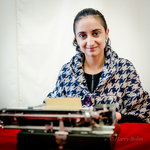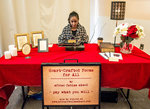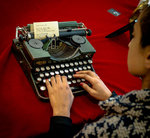Ever try writing a first-rate poem in five minutes? Possible. How about crunching out dozens of verses a day for total strangers who come to you with a subject and peer over your shoulder as you type …
This item is available in full to subscribers.
We have recently launched a new and improved website. To continue reading, you will need to either log into your subscriber account, or purchase a new subscription.
If you had an active account on our previous website, then you have an account here. Simply reset your password to regain access to your account.
If you did not have an account on our previous website, but are a current print subscriber, click here to set up your website account.
Otherwise, click here to view your options for subscribing.
* Having trouble? Call our circulation department at 360-385-2900, or email our support.
Please log in to continue |
|



Ever try writing a first-rate poem in five minutes? Possible. How about crunching out dozens of verses a day for total strangers who come to you with a subject and peer over your shoulder as you type their poem? Impossible.
Well, impossible is what Afrose Fatima Ahmed does.
I met her at a Christmas craft fair in Port Townsend. She was intently tapping keys on a circa 1926 Royal portable typewriter. A sign at her table plainly described what she sold: “Hand-crafted Poems for All – Pay What You Will.”
I commissioned her to write a five-minute poem about “space,” and expected something on the lines of "space, the final frontier … " but what she created was deeper and wider. Philosophers and scientists would be hard-pressed to describe space so clearly in only five verses. I wanted to know more about this exceptional writer and thinker, and Afrose was kind enough to agree to an interview about her work and life.
HB: Where were you born, raised and educated?
AA: “I consider myself a Texan-Washingtonian hybrid; my dream home is a place that has the beauty of the Northwest with the fusion culture of urban borderlands. My parents are Muslim immigrants from India. I did my undergrad at Fairhaven College, [Western Washington University], in Bellingham, and got an MA in Asian languages and literature from the University of Texas at Austin.”
HB: How long have you been doing farmers-market "poetry sales"? Do you do this in other towns and venues?
AA: “I began writing poems at farmers markets, festivals, independent bookstores and even the local food co-op earlier this year. I had read about the idea in Natalie Goldberg's “Writing Down the Bones,” and I've met one man who does it in Seattle, from whom I've received a couple of poems myself. I have done poems all over the Olympic Peninsula and in Seattle. I'm also available for private events!”
HB: Can you make a living at poetry?
AA: “I do have to do some other things to make a living, but on the whole, I have found that the "pay what you will" system is beneficial for everyone involved. It's meant to be accessible to anyone, regardless of their means, and I really don't judge or vary my writing based on what someone can offer. But I find that people who have the means will often be incredibly generous, beyond my expectations.”
HB: What brought you here to Port Townsend? From where?
AA: “I had been traveling in Europe prior to arriving back in the Pacific Northwest a little over a year ago. Before that, I had gone to live with my family for a short time in Eastern Washington, before that Istanbul, before that Houston."
HB: What inspired you to become a poet?
AA: “I had always considered myself the consummate city girl, but after spending a quiet summer in the rural south of France, mountain biking and working on a horse farm, I realized that I am much more content outside of an urban environment. I came to PT for the first time in September of 2014 and fell in love with the views of Mount Baker and Mount Rainier over the Salish Sea, with eagles and ravens and deer to keep us company. There is a great writing and dance community here as well, and the town has been incredibly supportive of me as a poet and teacher.
I've always written and kept journals since I could string together complete sentences, around age 8. Poetry poured from me at that time. I only allowed myself to pursue it seriously in the last couple of years, after my sister passed away suddenly. It became clear to me after losing her that I wanted and needed to spend every day doing something I am passionate about. I self-published my first short collection of poems, ‘He Won't Dance with Me,' around that time, and now I am working on my next collection, tentatively titled ‘Blood, Gold and Honey.’”
HB: People are always curious to know how one becomes a writer. What was your path to being a poet? Did you always want to be one?
AA: “I have always been a writer. I believe that if one writes, regardless of whether they are published, they are a writer. I am in love with language, with the written and spoken word; I find word play and metaphors sexy. And I turn to poetry in times of grief and in times of joy. I've also always been an avid reader of everything from science fiction to Jungian psychology, which is a key prerequisite for being a writer.”
HB: Artists have always had a difficult time making a living at their craft. What other jobs or career did you have before this one?
AA: “I've had a number of different jobs ... I've worked as a campus political organizer, a domestic violence advocate at a nonprofit, a fashion merchandiser for a luxury apparel retailer and an LSAT (law school admission test) preparation teacher. I also currently teach creative writing workshops and work with individuals on their own writing projects.”
HB: Lots of people want to write, but for whatever reasons can’t find the courage and discipline to do so. What motivates you to write?
AA: “I am a terrible procrastinator, so having a looming deadline to meet is helpful in writing the poems (i.e., the person doesn't have more than five minutes to wait around for me to write their poem). Usually as the person is speaking about their subject, an image or picture appears in my mind. I may not even know how it is related to the topic at hand, but I begin to write it down and see where it goes. Usually it's a surprise to me, too! I can also be a bit of a perfectionist, so this form of writing allows for and even demands a certain level of imperfection. It's the Japanese concept of wabi-sabi, the imperfection that makes the entire piece whole and beautiful.”
HB: It’s uncanny how you can hit the “emotional bull’s-eye” with your poetry with perfect strangers. How do you do that?
AA: “I like being able to reframe people's experiences; often people approach me with their grief at losing a loved one or growing older or having a bad day. I try to find the magic in them. It can be an experience with a numinous quality – a stranger who is willing to see you, hear you and then mirror back to you in beautiful language your life, your longing, your losses. All of this is crystallized in this little sacred object – a slip of parchment paper with the imprint of an old-fashioned typewriter font. But my favorite part is reading the poem out loud to the person. That's where I feel an intense, short connection with a complete stranger, and it renews my faith in humanity in a time when the world feels so incredibly chaotic and on the verge of extinction.”
HB: What dreams do you have for your life’s work and happiness?
AA: “I want to bring the visceral experience of truth and beauty to people through language – mine, theirs and everyone else's. I want to create a world in which we can play with words the way we used to play with paints or Legos or cars or dolls. It's a little terrifying to be a public poet, it can feel vulnerable and sometimes draining, but I do believe in bringing art into the public, in an interactive and unexpected way. I'm hoping to be able to feel safe and secure in the world as an artist, and hope that my steps towards that are inspiring for others.”
See Afrose Ahmed’s writings at afrosefatimaahmed.com.